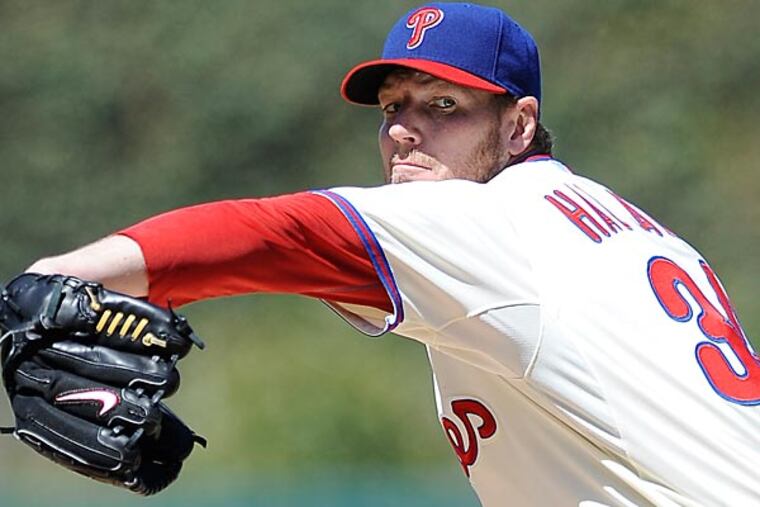Doc pitches in pain; Phillies fans left aching
It's a pretty easy choice. You can be mad at Andrew Bynum or you can be mad at Roy Halladay. You can't be mad at both.

It's a pretty easy choice. You can be mad at Andrew Bynum or you can be mad at Roy Halladay. You can't be mad at both.
Bynum spent the final year of his contract unable to play a single minute of basketball. There was bowling at one end of his wasted season and flamenco dancing at the other, but Bynum made sure the Sixers knew of every twinge of discomfort in his 25-year-old knees.
Halladay is spending the final year of his contract trying desperately to play baseball. There is no off-the-field nonsense, only a man working as hard as he can to find a way to earn his money. His biggest mistake is not letting the Phillies know about the twinges in his 35-year-old shoulder.
That is a mistake Halladay has made habitually over these last two confounding seasons. By refusing to acknowledge pain or injury - and worse, by treating reasonable questions about his condition as vile slander - Halladay perpetuates an atmosphere of mistrust between the Phillies and their deeply loyal fans. As sellouts become the exception rather than the rule, the team can ill afford to alienate the people who have financed its ascension to baseball royalty.
This is not an isolated episode. Throughout 2011 and 2012, all matters related to Chase Utley's knees were conducted as if by CIA black-ops specialists. Was the player lying to the team? Was the team lying to the fans? Who exactly makes decisions around here?
The other day, Halladay volunteered a passionate defense of pitching coach Rich Dubee in response to criticism leveled by former Phillies closer turned media analyst Mitch Williams.
"There are very few pitching coaches that I respect more than Rich Dubee," Halladay said.
That would be much more convincing if Halladay respected and trusted Dubee enough to tell him his shoulder hurt leading up to his April 30 start in Cleveland. After getting shelled to the tune of eight runs in 3 2/3 innings that night, Halladay said it was merely a case of not being "spot-on" against a very powerful lineup.
"I'm not discouraged at all," Halladay said. "I feel like we've really come a long ways, and I feel good about where I am."
Huh? He felt good about where he was? He couldn't have meant Cleveland. After what he said Sunday afternoon, we know his shoulder had been hurting for several days leading up to that game. And it was hurting leading up to Sunday's game.
The trouble with lying is that there's no way to know when you're telling the truth. Last year, in Clearwater, Halladay dismissed as "the extreme end of poor reporting" a column in which Fox Sports' Ken Rosenthal quoted unnamed scouts who believed something was physically wrong with Halladay.
Turns out something was physically wrong with Halladay.
Throughout the two-time Cy Young award winner's 2013 travails, all questions about his condition were met with the same sneering dismissal - by Halladay, by Dubee, by general manager Ruben Amaro Jr., and by manager Charlie Manuel.
But it turns out something is physically wrong with Halladay. Amaro said that was "pretty apparent" from Halladay's performance. But it has been very apparent for some time that something is physically wrong with Halladay.
That is nobody's fault. It may just be age and overuse catching up to the veteran pitcher. Maybe it's something that can be corrected with surgery or with rest.
Pretending everything is fine not only insults the fans who subsidize the $20 million salaries, it risks further damage. We'll probably never know what effect pitching through this pain had on Halladay's shoulder. We can't trust anyone to tell us, one way or the other.
Halladay has created a huge reserve of respect and support with his excellence and his toughness over the years. He has drawn on that reserve over the last 14 months by ripping the respected Rosenthal, being evasive about his condition, and implying that catcher Erik Kratz was an issue early this season.
The booing that accompanied Halladay's departure from Sunday's game suggests he is in danger of overdrawing on that account. And that would be a shame. Whenever it comes, the end of Halladay's career should play out with the same grace that distinguished the rest of his time in baseball.
The fans deserve that. More important, Halladay owes that to himself.